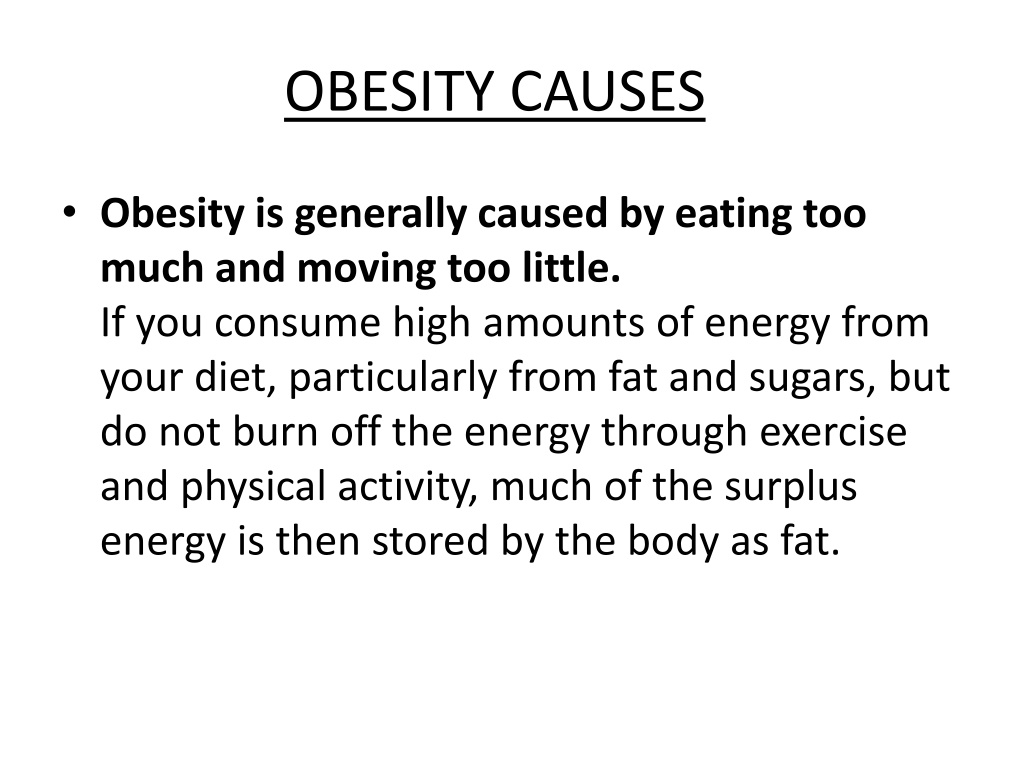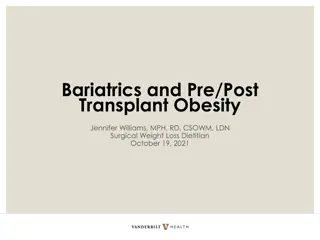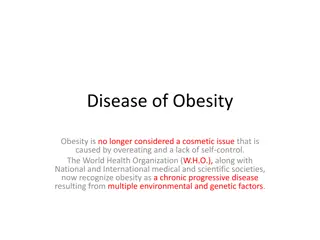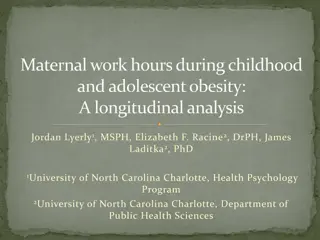Understanding Obesity: Causes and Factors Contributing to Weight Gain
Obesity is typically a result of consuming excess energy from a diet rich in fat and sugars while not expending that energy through physical activity. Factors like poor diet choices, lack of exercise, and genetic traits can contribute to the development of obesity over time. Environmental influences and unhealthy habits learned in childhood also play a significant role in the prevalence of obesity.
Download Presentation

Please find below an Image/Link to download the presentation.
The content on the website is provided AS IS for your information and personal use only. It may not be sold, licensed, or shared on other websites without obtaining consent from the author. Download presentation by click this link. If you encounter any issues during the download, it is possible that the publisher has removed the file from their server.
E N D
Presentation Transcript
OBESITY CAUSES Obesity is generally caused by eating too much and moving too little. If you consume high amounts of energy from your diet, particularly from fat and sugars, but do not burn off the energy through exercise and physical activity, much of the surplus energy is then stored by the body as fat.
Poor diet Obesity does not happen overnight. It develops gradually over time, as a result of poor diet and lifestyle choices, such as: eating large amounts of processed or fast food that is high in fat and sugar drinking too much alcohol alcohol contains a lot of calories, and people who drink heavily are often overweight eating out a lot you may be tempted to also have a starter or dessert in a restaurant, and the food can be higher in fat and sugar eating larger portions than you need you may be encouraged to eat too much if your friends or relatives are also eating large portions drinking too many sugary drinks including soft drinks and fruit juice comfort eating if you feel depressed or have low self-esteem, you may eat to make yourself feel better Unhealthy eating habits tend to run in families, as you learn bad eating habits from your parents when you are young and continue them into adulthood.
Lack of physical activity Lack of physical activity is another important factor related to obesity. Many people have jobs that involve sitting at a desk for most of the day. They also rely on their cars, rather than walking or cycling. When people relax, they tend to watch TV, browse the internet or play computer games, and rarely take regular exercise. If you are not active enough, you do not use the energy provided by the food you eat, and the extra energy you consume is stored by the body as fat. The Department of Health recommends adults do at least 150 minutes of moderate-intensity aerobic activity, such as cycling or fast walking, every week. This doesn t need to be done in one go, but can be broken into smaller periods. For example, you could exercise for 30 minutes a day for five days. If you are obese and trying to lose weight, you may need to do more exercise than this. It may help to start off slowly and gradually increase the amount of exercise you do each week.
Genetics Some people claim there is no point in trying to lose weight because "it runs in my family" or "it's in my genes". While there are some rare genetic conditions that can cause obesity, such as Prader-Willi syndrome, there is no reason why most people cannot lose weight. It may be true that certain genetic traits inherited from your parents such as having a large appetite may make losing weight more difficult, but it certainly doesn't make it impossible. In many cases, obesity is more to do with environmental factors, such as poor eating habits learned during childhood.
Medical reasons In some cases, underlying medical conditions may contribute to weight gain. These include: an underactive thyroid gland (hypothyroidism) where your thyroid gland does not produce enough hormones Cushing's syndrome a rare disorder that causes the over- production of steroid hormones However, if conditions such as these are properly diagnosed and treated they should pose less of a barrier to weight loss. Certain medicines, including some corticosteroids, medications for epilepsy and diabetes, and some medications used to treat mental illness including antidepressants and medicines for schizophrenia can contribute to weight gain. Weight gain can also sometimes be a side effect of stopping smoking.

























